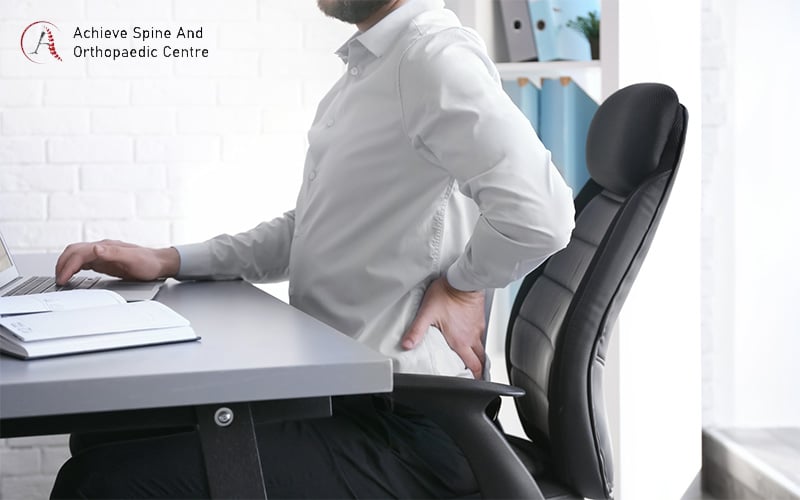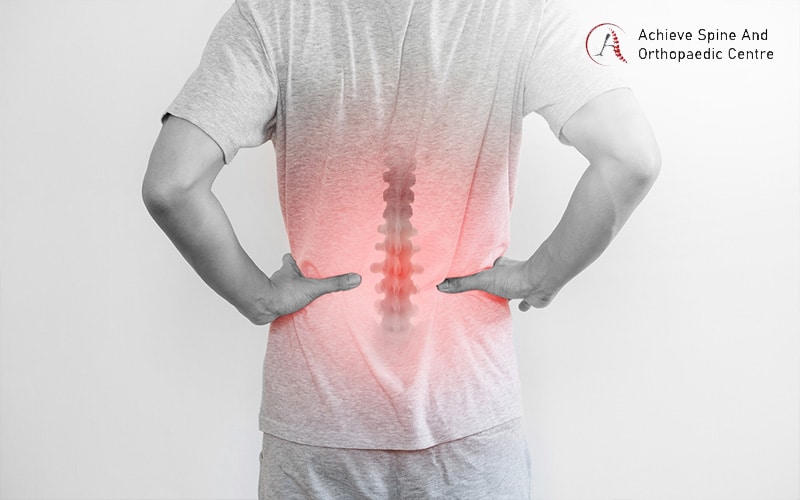Whether for work, study, or leisure, many Singaporeans today spend vast amounts of their time sitting at a desk. While sitting may feel comfortable in the moment, doing so for too long can actually take a toll on your body and even lead to a range of spine problems in the future. In this article, we explore how prolonged sitting affects your spinal health and offer practical tips to help you protect your spine.
How Does Prolonged Sitting Cause Spine Problems?

1. Increased Pressure on the Spine
Sitting for extended periods puts continuous pressure on your spine, particularly the discs in your lower back. Over time, this constant compression can contribute to disc degeneration and lower back pain. Compressing the spinal discs for too long can also affect their ability to absorb shocks effectively, increasing the risk of herniated discs or sciatica. To counteract these effects, try to stand up and stretch every 30 to 60 minutes to relieve pressure on your spine.
2. Poor Posture and Spinal Alignment
Your spine is designed to follow a natural curve, but sitting for extensive amounts of time without proper posture correction can distort this alignment. Slouching or hunching over places unnecessary stress on your spine, particularly on the vertebrae, muscles, and ligaments. This can lead to pain and stiffness in the lower back and even aggravate existing spine problems like scoliosis. For posture correction and spinal alignment, ensure your chair provides proper lumbar support, keep your feet flat on the floor, and maintain a neutral spine by sitting upright.
3. Neck and Upper Back Pain
Many of us spend hours looking at screens when sitting, leaning forward and tilting our heads down for long periods. This posture places significant strain on the neck and upper spine, leading to tension, stiffness, and discomfort. Over time, it can contribute to forward head posture—where the head is positioned too far forward relative to the shoulders—and even chronic neck or upper back pain.
Be mindful of your posture by keeping your screen at eye level, sitting with your shoulders relaxed and back straight, and aligning your ears with your shoulders. You can also incorporate regular stretches and strengthening exercises into your routine for neck pain relief.
When Should You Seek Professional Support?

It is not uncommon for individuals to experience temporary discomfort from prolonged sitting due to muscle fatigue. However, if the pain is persistent or accompanied by symptoms like tingling and numbness, it may indicate an underlying spine problem that requires professional attention. Conditions such as herniated discs and nerve compression can develop over time and may pose further risks to mobility, nerve function, and overall spinal health if left untreated. In these cases, conservative treatments and lifestyle adjustments alone may not be sufficient.
Treatment Options: Minimally Invasive Spine Surgery
For patients requiring surgical intervention, minimally invasive spine surgery (MISS) offers an alternative to traditional open surgery. This technique involves small incisions and specialised instruments to access the affected area, minimising disruption to surrounding tissues. As a result, there may be less impact on muscles and ligaments, which leads to reduced post-operative pain, a lower risk of complications, and shorter recovery times. Common procedures include endoscopic discectomy, lumbar or cervical decompression, and spinal fusion.
However, not all spine problems are suitable for treatment with MISS. A spine specialist needs to assess your condition, symptoms, and overall health to recommend the most appropriate treatment option for your situation.
FAQ: Can I Get My Neck “Professionally” Cracked?
Some people seek neck manipulation or “cracking” to relieve stiffness or discomfort. However, forceful twisting or cracking of the neck can be dangerous, especially if done incorrectly. It can put unnecessary strain on the arteries and vertebrae, potentially causing more harm than good. In fact, there have been reported cases where improper neck manipulation may be a contributing factor to serious injury or even death.
Instead, it is recommended to focus on gentle stretches, strengthening exercises, and good posture. Additionally, a doctor can also assess your unique needs and create a tailored programme to support your spinal health and prevent further discomfort.
Conclusion
Spending long hours sitting at a desk can take a serious toll on your neck and back, leading to spine problems that may worsen over time if not addressed. It’s important not to overlook the strain that prolonged sitting puts on your body. By being more mindful of your posture, you can make a difference in protecting your spinal health and maintaining comfortable movement as you age.
At Achieve Spine And Orthopaedic Centre (ASOC), our spine doctors offer thorough assessments and a personalised approach to spinal care. As specialists in endoscopic spine surgery, we use imaging technology and smaller incisions to target and treat spine conditions. Through this, we aim to reduce scarring and support a quicker return to normal activities, depending on individual circumstances. Our primary focus remains on patient safety and achieving optimal outcomes for each person.
Contact us today to find out more.

Wu Pang Hung
ABOUT AUTHOR
Dr. Wu Pang Hung is an experienced orthopaedic and spine surgeon in Singapore, specialising in both uniportal and biportal endoscopic spine procedures for complex cervical, thoracic, and lumbar spinal conditions. With over 10 years in the field, he is actively involved in numerous spine societies and contributes to several international journals and textbooks. Dr. Wu has also received specialised training in spine surgery across Canada, South Korea, Japan, and Germany.
Contact Us
WHATSAPP US @+65 9746 6178
CALL US @+65 9746 6178
MAKE AN APPOINTMENT



